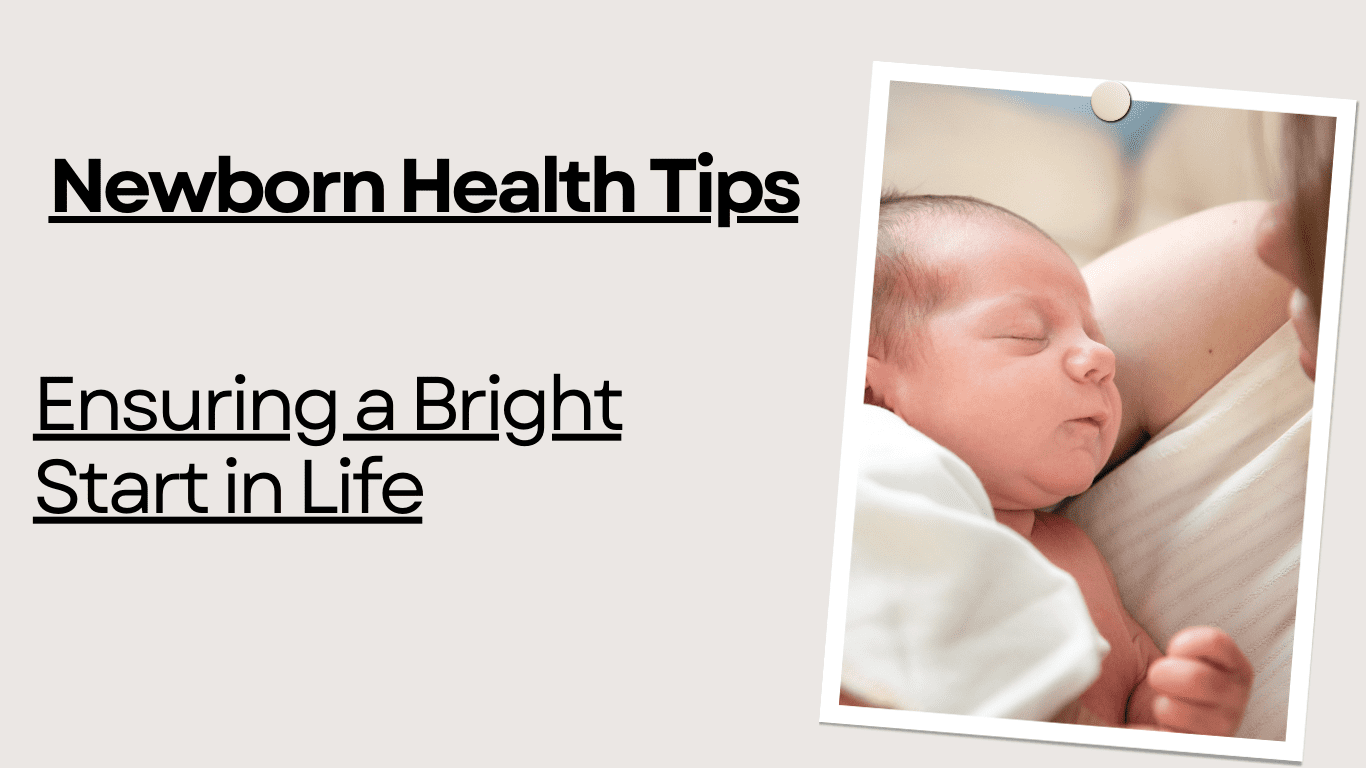Bringing a newborn into the world is a momentous occasion filled with joy and anticipation. As parents, we naturally want the best for our little ones, and that begins with ensuring their health and well-being. In this comprehensive guide, we will explore essential newborn health tips that every parent should know. From feeding and hygiene to sleep routines and vaccinations, we’ve got you covered.
Proper Nutrition for Newborns
- The foundation of a baby’s health is nutrition. It is very advised to breastfeed since it gives the infant important nutrients and boosts his or her immune system. If nursing is not an option, talk to your child’s pediatrician about the best formula.
- Benefits of Breastfeeding Antibodies that guard against illnesses and infections are abundant in breast milk. It facilitates healthy development and is easily absorbed.
- Guidelines for Formula Feeding Always prepare formula according to the manufacturer’s directions. When handling bottles and formula, keep your hands clean and sterile.
Nutrition for Kids: A Guide to Nurturing Healthy Eating Habits
Nurturing Mental Wellness in Children: Strategies for Kids Emotional Health
Maintaining Hygiene
Newborns have delicate skin that requires special care.
- Bathing Your Baby
- Use lukewarm water and mild, fragrance-free baby soap. Avoid vigorous scrubbing and ensure the room is comfortably warm.
- Diapering Tips
- Change diapers frequently to prevent diaper rash. Use gentle, hypoallergenic wipes, and apply diaper cream as needed.
Establishing a Sleep Routine
Healthy sleep patterns are crucial for both babies and parents.
- Safe Sleep Environment
- When putting your infant to sleep in a crib or bassinet with a firm mattress, always put them on their back. Eliminate loose blankets, pillows, and toys from the sleeping space.
- Regular Bedtime Routines
- Establish a relaxing sleep routine by engaging in activities like tale reading or lullaby singing. This aids in letting your infant know that it is time to go to bed.
Regular Pediatric Check-ups
Routine check-ups are vital for monitoring your baby’s growth and development.
- Immunization Program
- Observe your pediatrician’s advised timetable for vaccinations. Immunizations offer defense against dangerous illnesses.
- Growth Markers
- To make sure your kid is developing at a healthy rate, your doctor will monitor their weight, height, and head circumference.
Bonding and Emotional Well-being
Emotional well-being is just as important as physical health.
- Skin-to-Skin Contact
- Spend time holding your baby close to your skin and snuggling with him or her. Their body temperature is regulated and bonding is encouraged.
- Consider Cues
- Recognize your baby’s signs of hunger, pain, and fatigue. Quick replies increase security and confidence.
Conclusion
In conclusion, protecting a newborn’s health and wellbeing is a tremendous duty and an enjoyable adventure. The advice and recommendations in this article are meant to provide parents with the information and assurance they need to provide their babies with the greatest possible start in life.
Starting at birth, good nutrition—whether obtained via breastfeeding or formula feeding—lays the foundation for a robust immune system and normal development. Keeping up with cleanliness, such as gentle bathing and meticulous diapering, protects your child’s sensitive skin.
Setting up a regular sleep schedule benefits both your baby’s health and the peace and quiet of your home. To track your baby’s development and safeguard them against avoidable infections, routine pediatric exams, which include immunizations, are necessary.
Beyond the physical elements, your baby’s growth is greatly influenced by their mental health. A sense of security and trust is developed via skin-to-skin contact and reacting to your baby’s cues.
Remember that every baby is different and that there is no one-size-fits-all method as you begin this amazing adventure of motherhood. Trust your instincts, ask for help when you need it, and savor every moment you spend with your new baby. Your dedication, love, and care will leave a great legacy for them. I’m happy for you as you begin this new phase of your life.
FAQs
- How often should I feed my newborn?
- Newborns typically feed every 2-3 hours, but it can vary. Follow your baby’s cues for hunger.
- When should I start introducing solid foods?
- Most babies start solids around 6 months of age. Consult your pediatrician for guidance.
- How can I soothe my baby’s colic?
- Try gentle rocking, swaddling, or playing soft music. If colic persists, consult your doctor.
- What are the signs of a fever in a newborn?
- A rectal temperature above 100.4°F (38°C) is considered a fever in a newborn.
- When should I be concerned about my baby’s development?
- If you notice significant delays in reaching developmental milestones, consult your pediatrician for evaluation.





